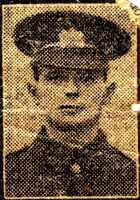
Photograph of Harry in Tameside Local Studies and Archives Centre. Reference: MR3/17/232

(L to R) Military Medal; British War Medal; Allied Victory Medal
Harry was born between January and March 1887 in Leek, Staffordshire. His father was called Francis and his mother was Isabella. He had 11 brothers and sisters. At least 5 were older: Frank, Miriam, Emily, Robert and Peter, and at least 2 were younger: Lily and Charlie. We don't know the names of the others.
Francis worked as a house decorator and in 1891 the family lived at 16 Regent Street in Leek. By 1901 they had moved north to the Moss Side area of Manchester. They now lived at 59 Alexandra Road. Between then and 1911 Francis died and Isabella moved to 40 Sowerby Street in Moss Side. She lived with Miriam, Emily, Peter, Harry, Lily and Charlie. All her other children had died by this time. All 6 siblings had jobs; Harry worked as a window cleaner.
The First World War broke out in August 1914 and Harry joined the Army on the 22nd November 1916. We don't know whether he volunteered for service or was conscripted, or anything about his early service.
We believe he joined a unit of the Manchester Regiment and was given the service number 45406. We don't know which battalion he joined or when he was first sent overseas. At some point we believe he was transferred to the 2/9th Battalion of the Manchester Regiment. As this was a unit of the Territorial Force Harry received a new service number: 352994.
The 2/9th Battalion served around Givenchy and La Bassee until late June 1917, when they moved north to Nieuwpoort, on the North Sea coast in Belgium. They guarded the coast until the autumn.
The Passchendaele Offensive began on the 31st July 1917. It was fought around the nearby town of Ypres. The 2/9th Battalion joined this campaign on the 9th October, when they took part in an attack on Poelcapelle. Harry had joined them by this time.
The battalion attacked over flooded ground that had been turned into a sea of mud by shelling and rain. Their attack began well, and they captured a number of German positions, but the mud slowed them down, and other German soldiers were able to inflict a large number of casualties. By the end of the day the attack was bogged down and could not continue.
During this fighting Harry carried out an act of great bravery. He was awarded the Military Medal in the London Gazette of the 14th January 1918, although the award is recorded in the 2/9th Battalion War Diary from the 27th October. There was no citation with the award, so we don't know what he did to earn it.
The 2/9th Battalion was merged with the 1/9th Battalion in February 1918. This new unit fought to stop the German Spring Offensive during March and April. It took heavy losses and later in April it was reduced to a small number of soldiers, known as a cadre, and used for training.
At around this time Harry was transferred to the Labour Corps. They gave him the service number 576197. We don't know exactly why Harry was transferred but the Labour Corps was made up of soldiers who were not fit or healthy enough to serve on the front line.
Soldiers in the Labour Corps did a wide variety of jobs, including constructing buildings and roads, moving supplies, and digging trenches or latrines. We don't know exactly what Harry did or where he served.
It would appear that Harry only spent a short time in the Labour Corps before he was transferred to the Worcestershire Regiment. Again, we don't know which unit he was assigned to. They gave him another service number: 64103. He was transferred again, to the 2/4th Battalion of the Oxfordshire & Buckinghamshire Light Infantry, at some point before he was discharged. They gave him the service number 48244. This battalion was sent to Egypt in March 1919. We don't know when Harry returned to the UK, but he left the Army on the 27th January 1920.
The rest of Harry's life is a mystery. He died in Manchester between October and December 1968, aged 81. His medals were donated to the Museum of the Manchester Regiment in August 1997.




